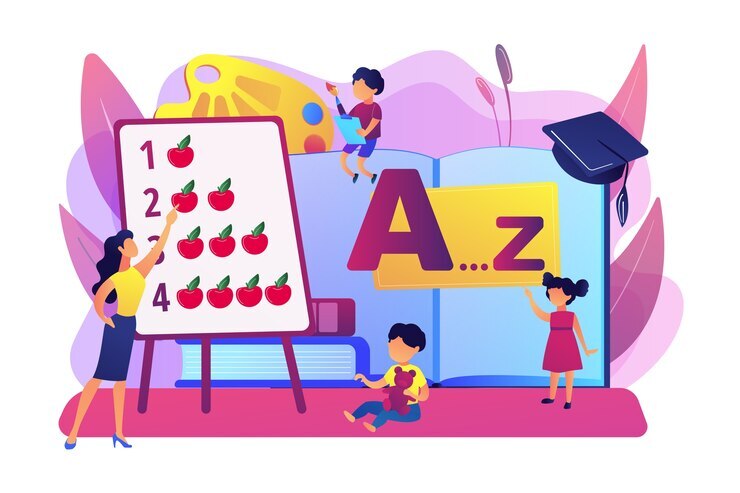



How Play Schools Prepare Children for Kindergarten

Discover how play schools prepare children for kindergarten through an introduction to preschool learning, structured routines, skill-building activities, and fostering independence. Starting kindergarten is a big milestone in a child’s life. It's the first step into a more structured educational environment and sets the stage for future learning. But before they step into that big world of kindergarten, play schools play a crucial role in preparing them. In this blog, we'll explore how play s




The Role of Play Schools in Early Development
Play schools, also known as preschools or nursery schools, are designed to offer young children an introduction to preschool learning. This early education is crucial for developing foundational skills that will benefit children throughout their schooling.
Play schools provide a structured environment where children can engage in a range of activities that foster their cognitive, social, and emotional development. These activities include play-based learning, interactive games, and creative exercises that are all aimed at making learning fun and engaging.
Cognitive Development: Play schools introduce children to basic concepts such as numbers, letters, shapes, and colors through playful activities. For example, children might learn to count using building blocks or recognize letters through interactive storybooks. This introduction to preschool learning helps children build essential cognitive skills that will be built upon in kindergarten.
Social and Emotional Growth: Social skills are an important aspect of early education. In play schools, children learn to interact with their peers, share, take turns, and express themselves. These social interactions help them develop emotional intelligence and self-regulation, which are crucial for a successful kindergarten experience.
Structured Routine and Discipline
One of the key aspects of play schools is their ability to introduce children to a structured routine. Kindergarten often follows a more rigid schedule compared to play schools, so getting accustomed to a routine can ease the transition.
Daily Schedule: Play schools typically follow a daily schedule that includes time for free play, structured activities, snacks, and rest. This routine helps children understand the concept of time and prepares them for the structured environment of kindergarten. By participating in a consistent schedule, children learn the importance of following routines, which helps them adapt more easily to the kindergarten setting.
Basic Discipline: Introducing children to basic rules and discipline is another crucial aspect of play schools. Simple rules such as raising their hand to speak or cleaning up after themselves are often taught in a play-based manner. This introduction to preschool discipline helps children understand expectations and behaviors that will be reinforced in kindergarten.
Building Essential Skills
Play schools focus on building skills that are fundamental for success in kindergarten. These skills include:
Fine and Gross Motor Skills: Fine motor skills involve the use of small muscles, such as those in the hands and fingers, which are essential for writing and other tasks. Activities like drawing, cutting with scissors, and manipulating play dough help develop these skills. Gross motor skills, such as running, jumping, and climbing, are also emphasized through outdoor play and physical activities.
Language and Communication: Developing language and communication skills is a key focus in play schools. Children are encouraged to express themselves through conversation, storytelling, and singing. Play schools also introduce children to new vocabulary and language concepts, which lays a strong foundation for reading and writing in kindergarten.
Problem-Solving and Critical Thinking: Play schools often incorporate problem-solving activities that encourage children to think critically and creatively. Puzzles, matching games, and building projects help children develop cognitive skills and learn how to approach challenges.
Fostering Independence and Confidence
Another important aspect of play schools is fostering independence and confidence in young children. As children prepare for kindergarten, they need to be able to perform basic tasks on their own and feel confident in their abilities.
Self-Care Skills: Play schools teach children basic self-care skills such as dressing themselves, using the toilet independently, and washing their hands. These skills are essential for managing daily tasks in kindergarten and help children feel more confident in their new environment.
Confidence Building: Play schools provide a supportive environment where children can explore their interests and try new things. By celebrating their successes and providing encouragement, play schools help build children’s self-esteem and confidence. This positive reinforcement prepares them to face new challenges and opportunities in kindergarten.
Creating a Smooth Transition
The transition from play school to kindergarten can be smooth if children are well-prepared. Play schools play a vital role in making this transition as seamless as possible.
Gradual Introduction: Many play schools incorporate activities that simulate the kindergarten environment, such as group activities and structured learning sessions. This gradual introduction helps children become familiar with the concepts and routines they will encounter in kindergarten.
Parental Involvement: Play schools often involve parents in the learning process, providing them with tools and strategies to support their child’s development at home. This collaboration between parents and play schools ensures that children receive consistent support during their transition to kindergarten.
Conclusion
Play schools are more than just a place for children to play; they are a crucial stepping stone in preparing them for kindergarten. By providing an introduction to preschool learning, structured routines, skill-building activities, and fostering independence, play schools set the stage for a successful transition to kindergarten.
For parents considering preschool options, understanding how play schools prepare children for this next step can help them make an informed decision and ensure their child is ready for the exciting journey ahead.
